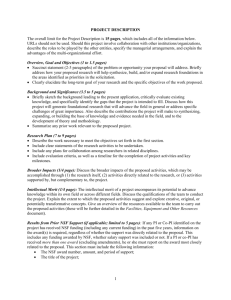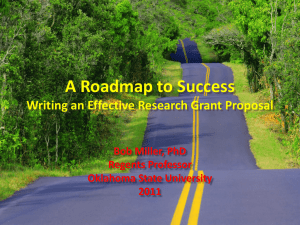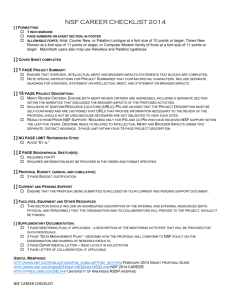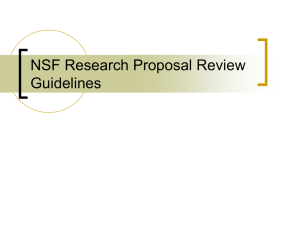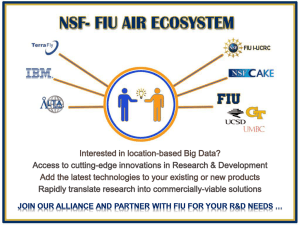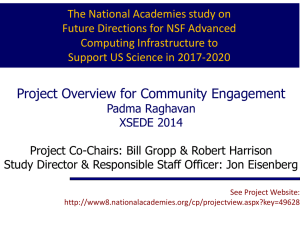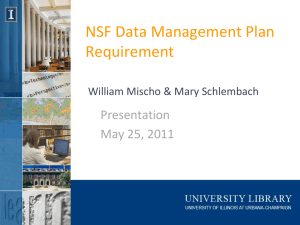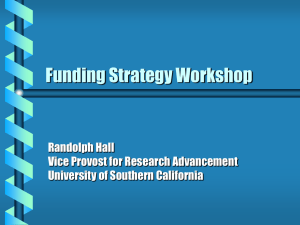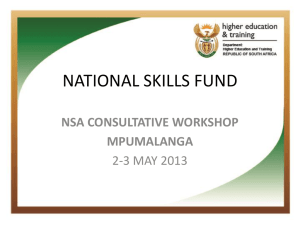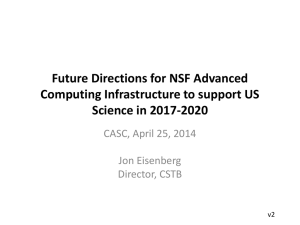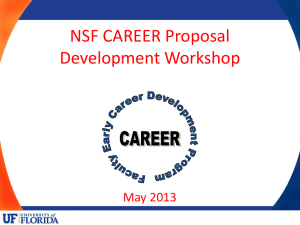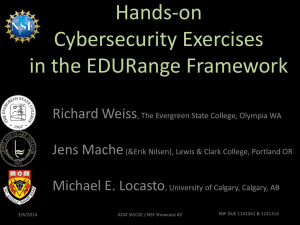NSF Research Opportunities For Social Scientists
advertisement
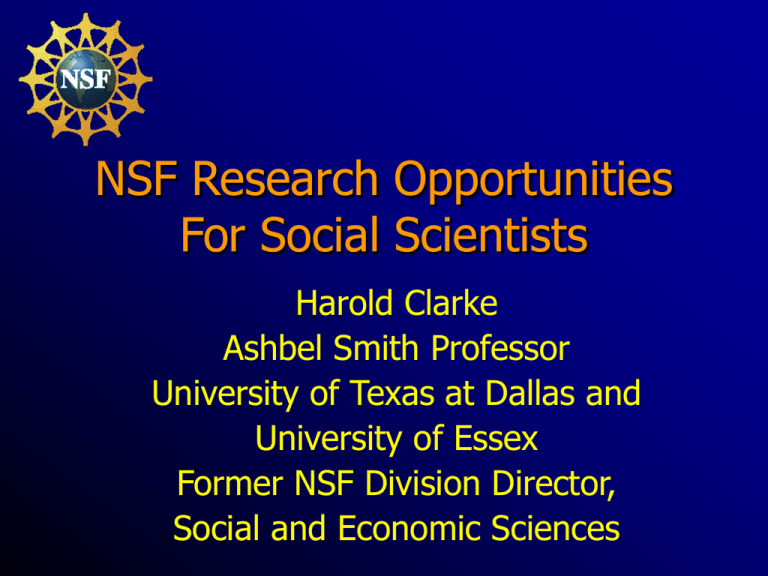
NSF Research Opportunities For Social Scientists Harold Clarke Ashbel Smith Professor University of Texas at Dallas and University of Essex Former NSF Division Director, Social and Economic Sciences NSF in a Nutshell • Independent Agency • Supports basic research • Natural & Social Sciences • Uses grant mechanism • Discipline-based structure • Cross-disciplinary mechanisms • Mix of Permanent & Visiting Staff Why You Might Want NSF Funding • Funds basic research • Funds both theory development & data collection • Funds infrastructure development – everything from submarines to software • Provides summer salary support • Funds doctoral dissertation research • Program Development Opportunities Office of the Director Directorate for Social, Behavioral & Economic Sciences Social and Economic Sciences Behavioral and Cognitive Sciences Science Resources Statistics Opportunities • • • • Unsolicited competitions Special initiatives (e.g., Democratization) Rapid response research (RAPID) Early concept grants for exploratory research (EAGER) • CAREER grants • Doctoral dissertation improvement grants Social and Economic Sciences FY09 Program Allocations (~millions of dollars) • • • • • • • • • Cross-Directorate Activities Decision, Risk, & Management Sciences Economics Innovation and Organizational Sciences Law and Social Science Methodology, Measurement & Statistics Political Science Science and Society Sociology $3.8 $7.5 $25.8 $3.4 $5.1 $4.0 $9.9 $8.9 $9.5 Directorate for Social, Behavioral, and Economic Sciences Where to Start? • www.nsf.gov • Check awards by program, keyword, etc. www.nsf.gov/awardsearch/ • Read solicitation carefully (if not unsolicited competition) • Download Grant Proposal Guide • Contact Program Officer once you have formed and organized your ideas SES Target Dates January 15 & August 15 Law and Social Science Political Science Sociology January 16 & August 16 Methodology, Measurement, and Statistics January 18 & August 18 Decision, Risk, & Management Sciences Economics February 1 & August 1 Science and Society February 2 & September 3 Innovation and Organizational Sciences Faculty Early Career Development (CAREER) Program • • • • • • Untenured faculty (or comparable) Single scholar award $400,000, 5-years minimum award Three proposals lifetime limit July 1 deadline High expectations Rapid Response Research (RAPID) • Research when data are ephemeral, e.g. study impact of stimulus package • $200,000 maximum; 1 year • 5 page project description • Internal review only • Contact program officer first Early Concept Grants for Exploratory Research (EAGER) • Exploratory work on untested, potentially transformative ideas • High-risk, high-potential payoff • $300,000 maximum; 2 years • Eight page description • Internal review only • Contact program officer first Dear Colleague Letter Example: Integrating HSD Goals into Core SBE Programs • Complexity Science • Large-scale Interdisciplinary Research • Infrastructure Proposal Process NSF Proposal Generating Document Returned as Inappropriate/Withdrawn Award via DGA Organization submits via FastLane Proposal Processing Unit Minimum of 3 Reviews Required Ad hoc NSF Program Officer Program Officer Analysis & Recommendation Panel Decline Both Organization Research & Education Communities Proposal received by NSF Div. Dir. Concur 4 months Proposal Preparation Time Review of Proposal Division Director Concur P.O. Recommend Award 30 days DGA Review & Processing of Award Finding Reviewers • Program Officer’s knowledge • References listed in the proposal • Google & online data bases • Reviewer’s recommendations • Investigator’s suggestions Human Subjects • No award for a project involving human subjects can be made without prior Institutional Review Board (IRB) approval of the research activity. • IRB approval is not needed at the time of proposal submission. Funding Decision Process • Program Officer decision • Feedback to PI • If Your Proposal is Recommended… • Scope of Work & Budget Discussions • Division Director Concur (typically yes) • Formal notification of Recommendation Two Funding Criteria • Intellectual merit • Broader impacts • Both are Important – intellectual merit is necessary but not sufficient Intellectual Merit • NSF funds basic research • NSF funds basic research • Intellectual merit means increasing knowledge through developing and testing theories, gathering data relevant to theory testing, developing methods relevant to theory testing • Leading-edge science Broader Impacts • Promote teaching, training and learning • Broaden participation of underrepresented groups (e.g., gender, ethnicity, disability, geography) • Enhance infrastructure for research and education, e.g., facilities, instrumentation • Disseminate results broadly to bolster scientific and technological understanding • Benefit society Budget Tips • Amounts – Reasonable for work – Realistic – Don’t be greedy! – Well Justified -- Need established (Do You Really Need 9 Trips to Paris?) – In-line with program guidelines • Eligible costs – Personnel – Equipment – Travel – Other Direct Costs, Subawards – Facilities & Administrative Costs Some Urban Legends about the NSF • Only funds scholars at elite graduate institutions • Only funds “famous” academics • Once declined, you are likely always to be declined • Only funds “normal science” • Only funds American topics • Panels make funding decisions Reasons for Declinations • • • • • • • “Trust-me” proposal (I’m a bright person!) Expertise gaps Too Expensive (Program budgets are small!) Incremental contribution Competition, Competition…. Bad luck Unhappy with Decision? You are not alone! NSF and the ARRA (Stimulus Package) • NSF - Total Stimulus Package ~$3 billion • SES - Total Stimulus Package ~$41 million • Very closely monitored (priorities CAREERS, 1st time investigators, review very well) • ARRA ONE-SHOT! • Back to regular business in 2010 How SES Spent the ARRA $ • SES initially given $27 million • Clarke-Scioli Experiment 8 + 1 shares (DD strategic reserve) • Can Small Programs Do More 1st Rate Science? • Yes! • Additional Competitions as $ became available • e.g., Political Science - $4.5 million Advice • • • • • • Study Important Topics Study Interesting Topics (Don't be boring!) Team up with smart people Team up with creative people Being interdisciplinary helps Critically review your own proposal – before you hit the ‘send’ button! Questions? National Science Foundation National Science Board Director Deputy Director Inspector General Biological Sciences Staff Offices Computer & Information Science & Engineering Social, Behavioral & Economic Sciences Engineering Education & Human Resources Geosciences Budget, Finance & Award Management Mathematics & Physical Sciences Information Resource Management Restrictions, Monitoring • In-House Proposals From Fall 2008 & Spring 2009 Rounds • Priorities -> • CAREERS • First-Time Investigators • RAPIDS & EAGERS • Dissertations • Closely Monitored
